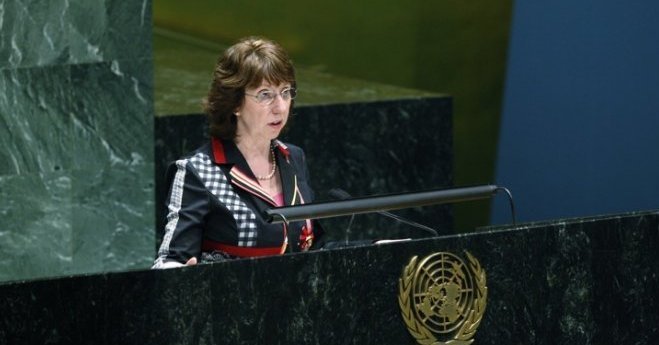This European specificity is not satisfactory
This observer status in itself is something quite new. Of course, the European Union can not get a seat for itself, because it’s accepted as an international institution whose member states are themselves members of the UN.
To convince the 174 other states, much has been promised. For example, as other regional organizations such as the Arab League or the African Union could achieve the same status. But for the EU, it can never be definitive.
The EU is not an international organization, and should not be considered either as such or as an object or member. This would mean it would not be taken seriously, as it happens today.
In addition, member states would still have the last word, at a pinch with a little coordination here and there, when Mrs. Merkel and Mr. Sarkozy are not campaigning inside. This should not happen. So yes, this status is better than the last, but it’s not enough. It can be at best a transition status.
A European voice, not the synthesis of 27 national votes
At the UN, these are officially states, in reality their executives, which are represented. In the case of democratic countries, it’s the government, the Ministry of Foreign Affairs who decides, with its autonomy, what attitude to have when voting. For example, a vote of Parliament is not to be organized before each vote at the UN. The real vote on foreign policy is held at the presidential or parliamentary elections. That is why we need Europe-wide debates on European foreign policy among European citizens, not discussions between national governments.
It is important that the European delegation has its autonomy. For this Baroness Ashton must stop listening to Member States and understanding her role as a mere coordinator. This assertion of independent European diplomacy should be the priority of next year. Only in this way other UN actors will understand the added value of the European Union, and that it should not be compared to international organizations.
One seat instead of 27
The ultimate objective must also be very clear: the 27 seats of the states must eventually disappear and give way to a single EU delegation. This will cause the usual problems with metaphysical moaners who say that only the states are represented at UN, and that the EU has nothing to do there [1].
It would be to wrongly ask the question: these are the executives, governments, diplomatic bureaucracies that are in fact represented at the UN [2]. The EU executive also must have its autonomy .
The end result should be the development of internal political debates on a European scale, on the foreign policy of the Commission and its future UN vote, as it is the case in member states nowadays.
Thus and only thus we can have debates among European citizens, and no false debate between national governments. Because it is a total nonsense to speak of “German foreign policy” or “French diplomacy.” There is a CDU-FDP foreign policy, a UMP or PS foreign policy, etc.. Similarly we should have proposals by European parties for a foreign policy. Then citizens will have to vote on that. In other words, a seat of the EU at the UN, it is not only a long-term goal, it is a democratic imperative.


Follow the comments: |
|
